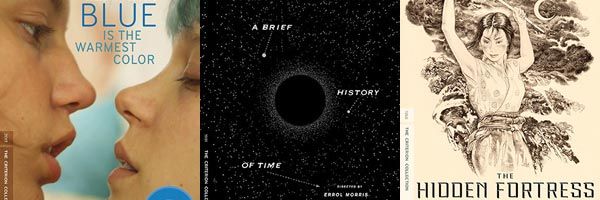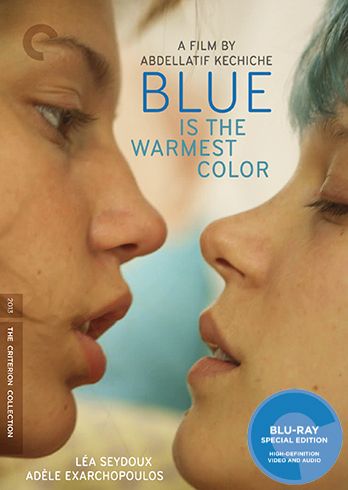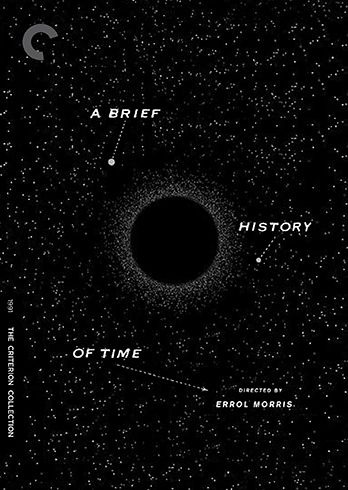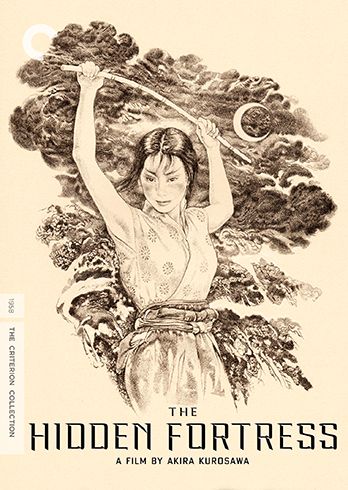Criterion has recently released Cannes Palme d’Or winner Blue Is the Warmest Color, Errol Morris’ A Brief History of Time, and Akira Kurosawa’s The Hidden Fortress on Blu-ray. What do these films have in common? Absolutely nothing.
Hit the jump for my Blue is the Warmest Color Blu-ray review, my A Brief History of Time Blu-ray review, and my The Hidden Fortress Blu-ray review.
Abdellatif Kechiche’s Blue is the Warmest Color starts by introducing Adèle (Adèle Exarchopoulos) as she beings to explore her sexuality. The girls she’s friends with tell her that a boy is cute, so she decides to have sex with him, while another girl seems to intimate that they could fool around. That Sapphic encounter doesn’t work out, but she does run across Emma (Léa Seydoux), first in a chance encounter, and a second time at a lesbian bar. Then the two begin dating, something that Adèle keeps from her classmates (at first) and her parents. Emma is a painter, while Adèle eventually decides to work with children. The two live together, but eventually it seems that Emma is having an affair, which leads Adèle to act out. It crashes their relationship, but Adèle can’t let Emma go.
Blue is the Warmest Color won the big prize at Cannes, but it seems the film is most famous for showing graphic lesbian sex scenes. It does, but Kechiche doesn’t film them in a way that feels exploitative, more clinical. Though the sex scenes are definitely explicit, they never comes across as unnecessary. They have a matter of fact quality, which – when you’re making a movie about sex and sexuality – is perfect. The fact that Steven Spielberg headed the jury at Cannes that gave it that festival’s highest honor may have put this film on a pedestal, as the film is nothing more than a character study, but it’s a brilliant one at that. It’s about a specific sort of relationship, something that becomes clearer the further the movie moves along. This isn’t about true love, even if Adèle will love Emma for the rest of her life. It’s about that inequality of love, when one person has kept their options open.
Spielberg was dead on when he talked about the performances. Both women are absolutely outstanding in the film with Exarchopoulos giving a star-making performance. Even if it’s going to take me a long time to figure out how to spell her name correctly, I can’t wait to see what she does next. They’re both so in the moment and committed that no matter the press that came out after the fact, it’s impossible not to be engaged with them. The film became known after the fact because its tumultuous set, but it’s not apparent in the film. It’s one of the best coming of age films in a long time, but it’s also just a tale well told.
Criterion’s Blu-ray presents the film in widescreen (2.35:1) and in DTS-HD 5.1 Master Audio. The film is in excellent condition, and the transfer is immaculate. Criterion announced that the film would be double-dipped, so the only supplements are a trailer and TV spot.
A Brief History of Time is a fine documentary, but it seems that the main reason why Criterion is putting it out is that it was a chance to rescue a pretty good film from obscurity, on top of a chance to work with Errol Morris. I’d be more excited if The Thin Blue Line was in the collection, but this is a fine watch.
Not so much an adaptation of Stephen Hawking’s infamous book as a biography that deals with the ideas from it, the film walks through Hawking’s life as he went from a bright student to a genius to someone dealing with a motor neuron disease related to amyotrophic lateral sclerosis (ALS). Special attention is then given to his theories about black holes, and what would happen if someone or something went into one. Perhaps the most provocative theory is the idea that the universe has no beginning or ending, which plays the big bang theory, and the creation of the universe (and Earth) a different reading.
Basically the film presents some heady ideas while also revealing how Hawking came to function in his wheelchair. To make it more than talking heads Morris peppers in some visual ideas, which involve showing some of the theories behind black holes. It’s all fascinating, and Morris finds a way of making it a visual journey, but it doesn’t feel like a next level documentary in terms of its approach or subject matter. But this is the weight that comes when evaluating Criterion editions. It’s great, but not great-great.
The Blu-ray version also comes with a DVD copy, and the film is presented widescreen (1.85:1) and with a newly mastered 5.1 DTS-HD master audio track. Though the film hasn’t been in circulation for the last twenty years, the transfer is flawless, with great detail (even during the dodgy CGI), and a beautiful color palette. Extras are limited to two interviews. The first is with Errol Morris (35 min.), and he proves gregarious and interesting, revealing they only shot Stephen Hawking for two days. The other is with cinematographer John Bailey (12 min.).
At this point it’s fair to say that Akira Kurosawa’s The Hidden Fortress is mostly famous for supposedly influencing George Lucas’s Star Wars. There are similarities. The film follows two peasants, Tahei (Minoru Chiaki) and Matashichi (Kamatari Fujiwara) who are lesser players in the grand drama. All they want to do is go home, but they keep getting put into slavery. When they do break free, they end up finding some gold hidden in wood, but they get noticed by General Rokurota Makabe (Toshiro Mifune), who keeps them around with promises of greater rewards. He portrays himself as a scoundrel, but he’s trying to protect Princess Yuki (Misa Uehara), the leader of a defeated clan, who may be able to rally her troops if she can return. Oh, along the way there’s an “evil” general who used to be friends with Rokurota, and the two have a breathtaking duel.
As Lucas himself notes in the supplements, the similarities are mostly incidental, but it’s easy to see why people would read Lucas as owing Kurosawa a debt, as Mifune comes across as Han Solo mixed with Obi-wan Kenobi. But it seems more likely that both filmmakers were influenced by swashbuckling adventure films, and -- even more so than Yojimbo or Seven Samurai -- this is Kurosawa at his most fun and light-hearted. The film is about the spectacle, and in one sequence you get to watch Mifune hold a sword with two hands while a horse is at full gallop. The film is an adventure tale, and as such, it’s a blast.
This was also Kurosawa’s first film in widescreen, and he has so much fun playing with the frame. Often composing the four lead characters in the same shot, it’s usually brilliantly composed. If anything, the film’s greatest weakness is that it’s just entertaining. Then again, when you have a master providing such thrills, it’s rewarding and extremely rewatchable.
The Criterion Blu-ray comes with a DVD copy. The film is presented in widescreen (2.39:1) and in a new DTS-HD 3.0 surround, along with a lossless 1.0 mono mix. . The picture quality is excellent, and it comes from a recent 2K mastering, so the blacks are pure, and there’s very little visible damage. The soundtrack is also excellent, with the stereo effects not out of place. Though Criterion released the film on DVD, they got Stephen Prince to record a new commentary for the film, and it’s a fun listen. The man knows his Kurosawa and it shows, while also offering great commentary on the setting, on Kurosawa’s approach and on the composition. The supplements kick off with an interview with George Lucas (9 min.), and he mostly enthuses about the director, while there’s also the Fortress episode of “Akira Kurosawa: It’s Fun to Create” (41 min.) where Kurosawa talks about the influence of John Ford on his cinema. Also included is the film’s theatrical trailer.




